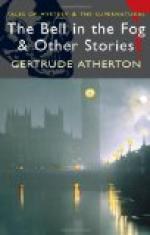She had looked in pale horror, and taken refuge in an axiom: “Conscience makes cowards of us all.”
He moved his head with involuntary pride. The greatest achievement of civilization was the triumph of the intellect over inherited impressions. Every normal man was conscientious by instinct, however he might outrage the sturdy little judge clinging tenaciously to his bench in the victim’s brain. It was only when the brain grew big with knowledge and the will clasped it with fingers of steel that the little judge was throttled, then cast out.
Conscience. What was it like? The doctor had forgotten. He had never committed a murder nor a dishonorable act. Had the impulse of either been in him, his cleverness would have put it aside with a smile of scorn. He had never scrupled to thrust from his path whoever or whatever stood in his way, and had stridden on without a backward glance. His profession had involved many experiments that would have made quick havoc of even the ordinary man’s conscience.
Conscience. An awkward guest for an unsuspected murderer; for the groundling whose heredity had not been conquered by brain. Fancy being pursued by the spectre of the victim!
The woman on the bed gave a start and groan that recalled him to the case in hand. He rose and walked quickly to her side. Her eyes were closed, her face was black with congested blood. He laid his finger on her pulse. It was feeble.
“It will not be long now,” he thought.
He went toward his chair. He felt a sudden distaste for it, a desire for motion. He walked up and down the room rather more rapidly than before.
“If I were an ordinary man,” he thought, “I suppose that tortured creature on the bed would haunt me to my death. Rot! A murderer I should be called if the facts were known, I suppose. Well, she is worse. Did I permit her to live she would make the living hell of four people.”
The woman gave a sudden awful cry, the cry of a lost soul shot into the night of eternity. The stillness had been so absolute, the cry broke that stillness so abruptly and so horridly, that the doctor, strong-brained, strong-nerved as he was, gave a violent start, and the sweat started from his body.
“I am a fool,” he exclaimed angrily, welcoming the sound of his voice; “but I wish to God it were day and there were noises outside.”
He strode hurriedly up and down the room, casting furtive glances at the bed. The night was quiet again, but still that cry rang through it and lashed his brain. He recalled the theory that sound never dies. The waves of space had yielded this to him.




